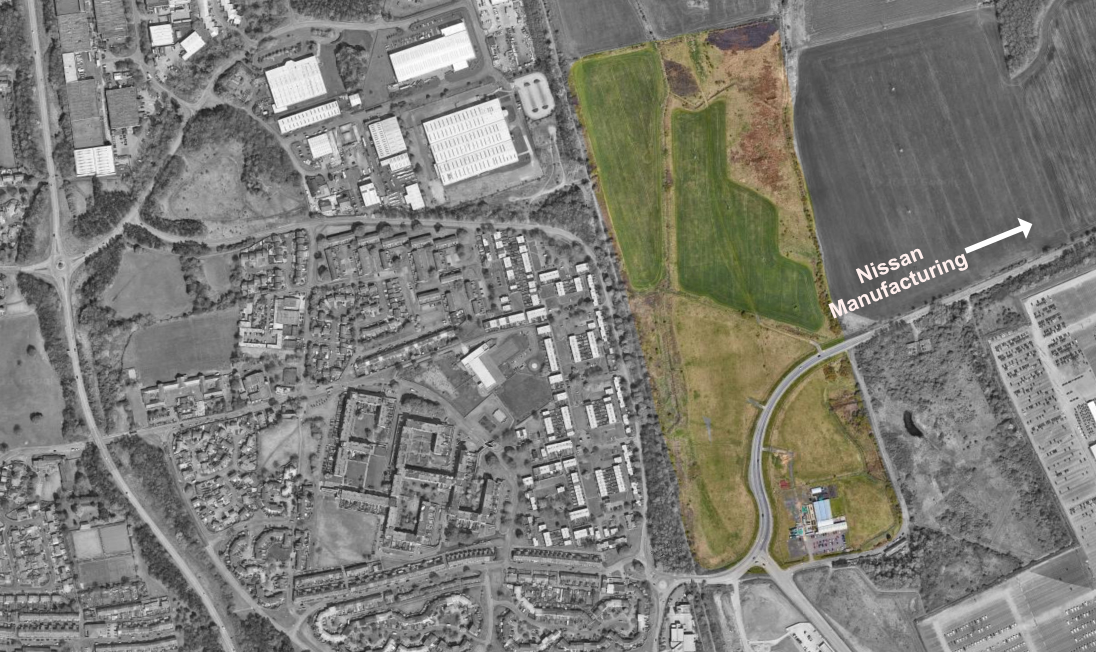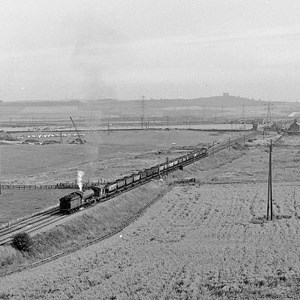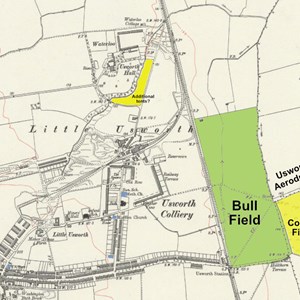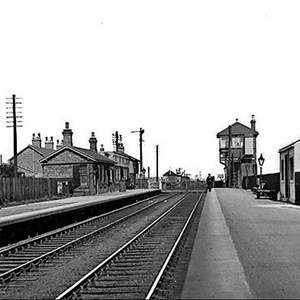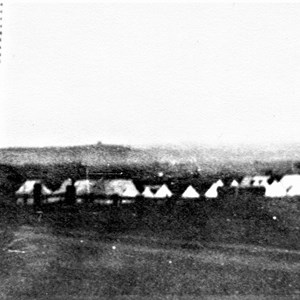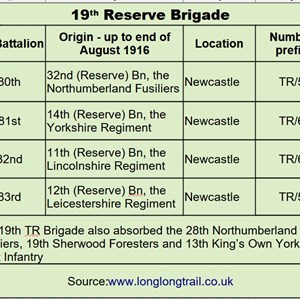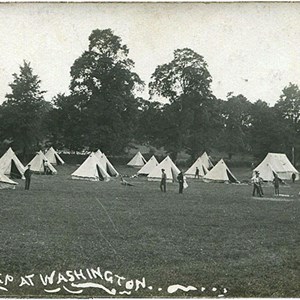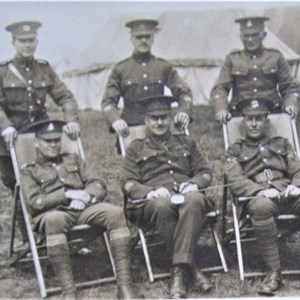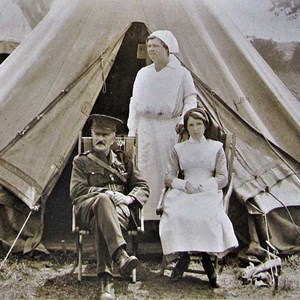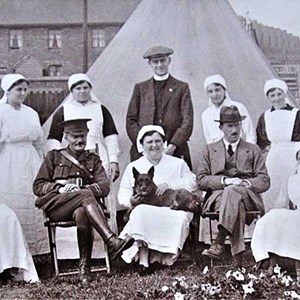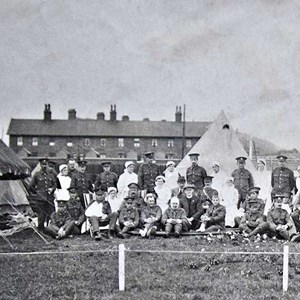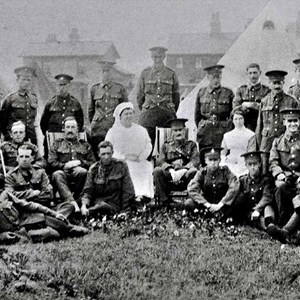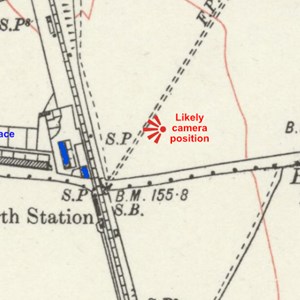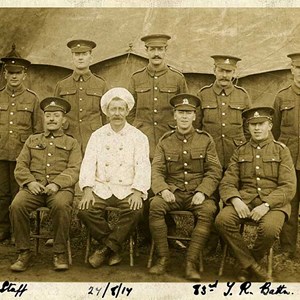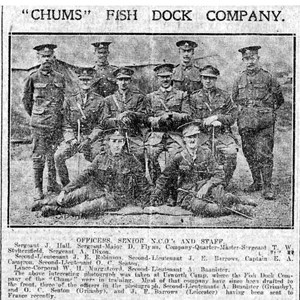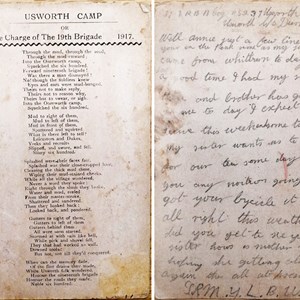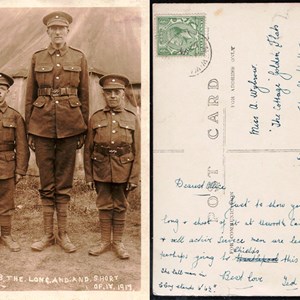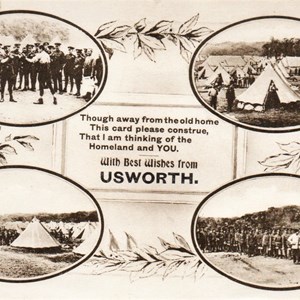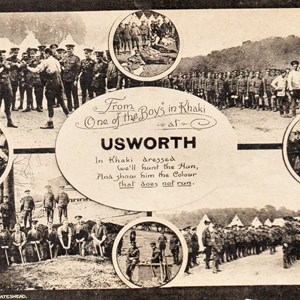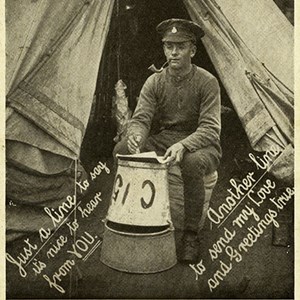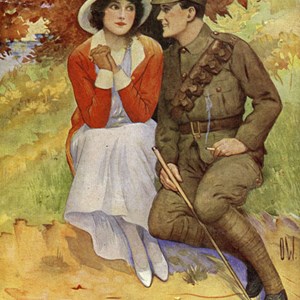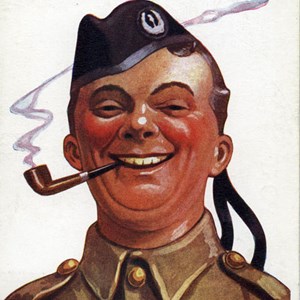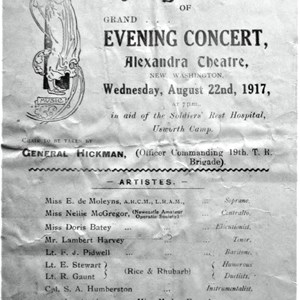Bull Field Training Camp
The First World War Army Training Camp
at The Bull Field, Usworth
In June 2023 Washington History Society learnt of a proposed new housing development on a site immediately east of Sulgrave Village of Washington. Members quickly identified the site as The Bull Field which was near to the now demolished Usworth Railway Station- see green shading on map- see the first photograph, taken long after the field had been evacuated. A member dug out a poor quality photograph labelled “Bull Field Army Camp”, dated from the First World War, showing a tent encampment with Penshaw Monument in the distance.
Location
After conscription started at the beginning of 1916 the Army was faced with training hundreds of thousands of men; beyond the capacities of individual regiments. On 1 September 1916 the process was centralised by the establishment of Training Reserve Battalions. The position of Usworth camp in The Bull Field at Usworth was attractive because of its proximity to Usworth railway station just a few yards away, on a line connecting Newcastle and Durham, and with South Shields where military embarkations took place. It was near New Washington just a few hundred yards to the west with shops, pubs, churches and other social facilities.
A local resident, whose parents lived near Usworth Station in WW1, provided the following information:
“In 1914 my mother was 13 and lived in Johnson Terrace which is close to the former railway line and to Usworth Station. She always referred to the field lying immediately to the east of the line and to the north of the road to Hylton, as being The Bull Field and the site of the Usworth army camp.
When I was young, she and I would often visit a friend who lived in Hillthorn Terrace [later renamed Severn Houses] and I was repeatedly warned never to go into the nearby Corner Field (see map) as this is where the soldiers were trained to build trenches, now filled with water and dangerous.
She also talked about watching soldiers being loaded onto trains at the station with many in tears and often physically forced to board.”
The Bull Field is about 25 hectares in size (61 acres), but it is not known how much was taken by the camp. However the photograph labelled 'Washington Camp' below was taken in a field across from the field within the Usworth Colliery area. We have no evidence if this was a long term use of the site or under the control of The Bull Field authorities.
Regiments which trained at Usworth Camp
The excellent website, the longlongtrail.co.uk, which documents the British Army in World War One, shows that the 19th Training Reserve Brigade, commanded by General Hickman, was assigned to the Newcastle District with the 81st and 82nd located at TR/6, and the 80th and 83rd at TR/5- Usworth.
In his memoirs, Albert Walmsley, who was born in Usworth in 1908, remembered walking past The Bull Field which, he said, stretched from Usworth Station to Usworth Pit. He recalled three regiments in training there – the Notts, the Derby’s and the Leicesters. Other soldiers (presumably officers) were boarded in the New Inn and in Washington Miners Hall in New Washington. The Salvation Army Hall was used as a cookhouse.
(Click on the images to enlarge them)
Camp Life
The wartime memoirs of William Scholey, a former teacher from Barnsley who enlisted for war service in 1917, have been kindly forwarded to the History Society by his grandson, David Scholey. It records that William trained at Usworth camp before being sent to France. He had a wife Gladys and a two year old son, Edgar. The course would have lasted for 14 weeks, with final training being carried out in France. Extracts from his daily diary, with references to life in Usworth camp, are below (note-they are written with no edits or corrections :
FRIDAY JUNE 15 1917 Public Hall 9-00am Home 10am-1115am Left
Barnsley 11-55 for Pontefract. Medically examined B1. Issued with clothes &
kit took cases to station. Went in park, saw Sergeant Wainwright. Slept in
Barracks lost "Civvie" look
SATURDAY JUNE 16 1917 Up 5-30am hair cut ....what a crop. Left Pontefract
for Usworth 12-25 in charge of Hudson & Cooper Reached camp via York &
Newcastle about 5-30 . Tea cold water, bread, butter & cheese
Issued with blankets bed 9-30.
SUNDAY JUNE 17 1917 Up 5-45 Church Parade U.A.Bat, 8-25 dismissed.
cleaned lines. Confined to camp. On piquet 7-15 tonight-7-30 tomorrow.
Paraded 7-15 & 9-45.Lazy day, food-fair.
MONDAY JUNE 18 1917 Up 5-45 Parade 8-40-12-00 forming fours and
turning, attention, stand at ease etc. Parade afternoon 2-4 vaccinated
morning.
TUESDAY JUNE 19 1917 Up 5-45 Parade 8-40-12-00. Drill as yesterday in
squads. vaccination dressed Parade 2-4 Had rifle explained. Went out 7-00-8-
30 with my pal friend Had supper at Soldiers home, Wesleyan Chapel [possibly
Edith Avenue just a few hundred yards west, coloured blue on map]
WEDNESDAY JUNE 20 1917 Parade 7-40 - 12-00 Turning etc saluting,
vaccination dressed Parade 2-4 .Issued with equipment and shown how to put
some of it together.
THURSDAY JUNE 21 1917 Parade 7-40 -12 As yesterday right and left incline.
Still in squads .Parade 2-4 more about equipment and put it together. Had to
clean it all at night What a business! Very hard day , issued with dixie cans.
FRIDAY JUNE 22 1917 Vaccination bad. Parade 7-40-12-00 as yesterday with
left and right form, Parade 2-4 Issued with rifles. Shown how to clean
it. .Cleaned it at night. Vaccination bad.
SATURDAY JUNE 23 1917 Bit of sensation during the night. Two committed
suicide, a private and a sergeant One died in camp the other at Sunderland
hospital. So the story goes, Parade 7-40-12-00 as yesterday but in platoons
and companies. Went out at night for about 3 hours not much to see,
Vaccination bad.
SUNDAY JUNE 24 1917.Confined to tents Doctors orders had vaccination
inspected by Dr improving .Miserable day.
MONDAY JUNE 25 1917 No drills today. still resting .Many very bad mine
improving nicely ,Went to C of E service in morning 11-11-30 @ Y.M.C.A. In
all day. Concert at night in YM good. Cigs powder etc from G [Gladys].
TUESDAY JUNE 26 1917 No drills again Dr's orders. Man tried to hang
himself during night. Had vaccination inspected again. Went to U.A.B service
at Y.M,11-11-30 Good again, What a life !
WEDNESDAY JUNE 27 1917 Again no drills. Got parcel soap mince pies buns
razor strop etc. Went to free concert & supper at PM church v. good cricket
match in afternoon
THURSDAY JUNE 28 1917 Lectures on gas gas attacks gas shells, One on
trenches by Captain. Said training would extend over 14 weeks. Lecture on
rifle in afternoon. Called to gate to see Ernest Ashurst & fiancee (Bertha). Saw
them again 6/8-10 when they left for Walker. Nice to talk to someone one
knows.
FRIDAY JUNE 29 1917 No parades. Out a bit at night, nothing doing
SATURDAY JUNE 30 1917 Vaccination inspected. Mine passed fit went for
walk at night.
SUNDAY JULY 1 1917 Church Parade with UAB to PM church (Belts & side
arms). Very nice indeed Back in camp 10-15.Went out a couple of hours in
afternoon towards Sunderland. Nicer down there than anywhere. In the
evening went through the fields to the River Wear. Splendid down there. Sing-
song at YM.
MONDAY JULY 2 1917 First lesson in PT (feet close, heels raise hold back
bend hips firm, arms bend & sideways stretch) Saluting in afternoon. Short
rifle lecture. Evening washing.
TUESDAY JULY 3 1917 Innoculated 11-45 painful in afternoon, Scarcely any
sleep at night.
WEDNESDAY JULY 4 1917 No parades, Innoculation very painful Feel very
bad,
THURSDAY JULY 5 1917 Much better, Arm drill 2-4.(slope, order, trail) Out
in village at night.
FRIDAY JULY 6 1917 Big day, arm drill PT 9-1.arm drill 2-4 (slope, order trail
park present) Saluting on march 5-6 pay 6-30 sewing numbers on
SATURDAY JULY 7 1917 Arm drill. Kit inspection after dinner. Down to river
after tea and made arrangements for tea tomorrow.
SUNDAY JULY 8 1917 Church parade in morning. Bit of lecture by Lt. Col.
Court Martial read cut, Went down to river at 2. Had tea there back at 7 Grand
day, Parcel from Gladys (cigs cake, pipe etc)
MONDAY JULY 9 1917 Moving day. Removed to C. Company . Friend in B
Company (rotten), Lecture on venereal by Dr, Lecture by Co O.C. 5-15-6-15
TUESDAY JULY 10 1917 Gas lecture in morning. Innoculated 2nd time about
12. Very bad at night, had to come out of concert,
WEDNESDAY JULY 11 1917 Resting. Much better today. Went to concert at
Rec Room -- rotten.
THURSDAY JULY 12 1917 Parade in afternoon - Gas lecture. Out a bit at
night.
FRIDAY JULY 13 1917 Bomb lecture in afternoon . Bomb throwing. PT. Arm
drill-present .Parade 5-10.putting equipment together. Cleaning equipment at
night
SATURDAY JULY 14 1917 Fitting up equipment .Muskets lecture. Wire from
G [Gladys] to arrive Newcastle at 4-14. Went to meet her then on to Walker.
Back 9-23.
SUNDAY JULY 15 1917 Church parade . Walked to Heworth in afternoon &
met Gladys, Edgar & Aunt Maggie. Came back to Usworth, had tea and saw
them off by motor.
MONDAY JULY 16 1917 PT. Arm drill. Net G & E [Gladys & Edgar] 6-10 Got
digs in Usworth for Wednesday . G left 3-8 train.
TUESDAY JULY 17 1917 PT, Musketry (aiming) . In afternoon march past and
arm drill, In all night.
WEDNESDAY JULY 18 1917 Rainy day, lecture on care of arms. PT in
afternoon in YMCA. Gladys arrived in afternoon and took rooms C/O Stoker
11, Westgarth Terrace, Washington
THURSDAY JULY 19 1917 Parade warning PT & Arm Drill, early dinner.
March to Heworth, car to Gateshead to baths. Back via Wrekenton reached
camp 6-15. With Gladys 7-10-9-15
FRIDAY JULY 20 1917 Parade PT Arm Drill & Musketry, judging distance etc .
out 6-9.15
SATURDAY JULY 21 1917 Parade PT Arm Drill & saluting . Out 3-
9.15
SUNDAY JULY 22 1917 Church Parade Out 10.40-0.15 Grand day out in
fields with Gladys & Edgar in afternoon
MONDAY JULY 23 1917 Parade Arm drill PT Very hot, rest 12-3 lecture till 4
on Guards Inlying piquet went to see Gladys at 6.15-7 G & E been to South
Shields Picquet parade 7.15-9.45
TUESDAY JULY 24 1917 Parade 8-12.PT Arms & squads drill afternoon 2.15-
4, care of arms & parts of rifle Out 7.45-9.15
WEDNESDAY JULY 25 1917 Parade 8-12 PT Armdrill & musketry & bayonet
firing Out 7.45-9.30
THURSDAY JULY 26 1917 Parade 8-12 PT Arm drill Bayonet firing Issued
spades & picks. Company laughed at.... stand at ease with picks! consequence..
Company confined to barracks till Saturday
FRIDAY JULY 27 1917 Reveille 4-45 Breakfast 6.Parade 6.40.Marched to
fields behind Usworth colliery. Trench digging until 10.Second breakfast races
wrestling etc, Back 12-40. Kit inspection in afternoon, Confined to barracks all
night. Poured with rain.
SATURDAY JULY 28 1917 Parade 8-12 PT Arm drill Squad drill saluting, Out
2.40-9.30
SUNDAY JULY 29 1917 Church Parade .Out 10,40-9.30. Rainy day so didn't go
out,
MONDAY JULY 30 1917 Parade. PT Arm drill musketry, fixing bayonets. Rifle
Inspection at night cleaning equipment Out 7.10-9.30 Very cold day
TUESDAY JULY 31 1917 Parade PT Musketry Firing on miniature range in
afternoon ...fine. Got sleeping out pass. Cricket match until 6. 0ut 6,30 slept at
Westgarth Terrace, still cold
WEDNESDAY AUGUST 1 1917 Up 5.15 in camp 5.50. Parade.PT, Fixing
Bayonet. Hurried march past aerodrome and back. Short lecture on night
operations for tonight. Operations in trenches. Night op off owing to rain. Out
6.20 to reveille.
THURSDAY AUGUST 2 1917 Up 5.15 Camp 5.40. Still raining. Lectures
morning & afternoon on musketry, bayonet fighting etc Out 7 till reveille
FRIDAY AUGUST 3 1917 Up 5.15 Camp5.45 Musketry, Lying load, loading
etc. march round by aerodrome in afternoon [Usworth RAF Airfield]. Harry,
Bert & mother up until 8.8 train when returned to Newcastle.
Harry on hospital furlough (4/-(four shillings = 20p) pay)
SATURDAY AUGUST 4 1917 Up 5.10 Camp5.40 march round Washington.
Kit inspection in afternoon Out 3.40-
SUNDAY AUGUST 5 1917 Up 5.10 Camp 5.45 Cleaned equipment. Church
parade Out 10,45 Friend up to tea. Went walk at night.
MONDAY AUGUST 6 1917 Up 5.Camp 5.35 Musketry, lying position ,triangle
of error etc. Holiday in afternoon (Bank Holiday) out 2 went to Roker via
Southwick (Edgar, Gladys, Mr & Mrs Clifford Mona) grand day back 9.15
TUESDAY AUGUST 7 1917 Up 4.40 Camp 5.30 Breakfast 6.30 Range 7-1 2
inch group 16/20 in application . Out to parade 2.30-4. little arm drill.
Watching tug of war most of afternoon out 7 Short walk Wrote to Paul re
cheque.
WEDNESDAY AUGUST 8 1917 Up 5,10 Camp 5.45 PT Little arm drill.
Dismissed 11 Dinner 11.30 On parade 1-4 10,11,12 on range Easy afternoon
Short lecture after tea marking on range Out 6.15
THURSDAY AUGUST 9 1917 Up 4.40 camp 5.30 Rainy morning. Short walk
through village in morning Bayonet fighting in aft. ON GUARD position Out
6,30
On 3 October 1917 William’s unit was shipped from Folkstone to Boulogne, and then transported to Ypres for final training. The training was in preparation for the battle of Passchendale, in the third battle of Ypres. It was in this battle that mustard gas rather than chlorine gas was used by the Germans, leading to massive casualties. In the event it was discovered that William had a medical condition which prevented him from participating in the battle. He was shipped back to Catterick and was probably given light duties for the remainder of the war. William was honourably discharged from the Army in 1919.
The horrors of the war, with so many soldiers killed and wounded, would have been well known by 1917, and it is perhaps unsurprising that a number of trainees at Usworth Camp committed suicide rather than be sent to the front. In addition, there were sometimes casualties during training. The Sunderland Daily Echo and Shipping Gazette referred to the death of Private W A Cox of the Leicester Regiment, who was accidentally killed at the camp on 28 July 1916 after getting kicked in a football game.
It is clear from the photographs that the site also served as a medical and recuperation centre. Indeed a 1917 press report referred to it as the 'Usworth Rest Camp'. As yet, here is no evidence if this was from its inception, or what type of casualties stayed here. It is unlikely they over-wintered here.
Postcards
the History Society and the Raggyspelk website have copies of postcards sent from Usworth Camp by soldiers. The postcards are a mix of personal and generic, with the Washington and Usworth captions superimposed, but nevertheless they give an idea of camp conditions and activities, including the tented accommodation, parades, trench digging, boxing matches, queuing for food etc.
History Society member, David Walmsley, has an amusing postcard 'The Charge of the 19th Brigade', a poem about the digging of drains at 'Oozeworth Camp', no doubt a skit on the local accent.
(Click on the images to enlarge them)
To find out more about the impact of World War One on Washington see Wessington U3A War Memorials Project - Home (weebly.com) and Washington, Co. Durham (raggyspelk.co.uk) (Click on What's Where)
Relations with the Public
In addition to the recreational activities within the camp there would have been opportunities to become involved in local events. The programme shown refers to a concert held in the Alexandra Theatre in nearby New Washington ( coloured red on map, later the Regal Cinema, Concord, which burned down on 17 April 2017).
Local churches and chapels are known to have played an important part in catering for the welfare of the soldiers:
17 October 1916 FREE CHURCHES AND USWORTH CAMP (Durham Advertiser)
"A tea and public meeting were held in the PM (Primitive Methodist) Schoolroom on Saturday at which the Rev R Radcliffe presented his report as officiating clergyman under the United Army Board, of the work done among the soldiers during their stay at Usworth Camp.
The report shows splendid work done on behalf of the troops while in camp there. As far as figures can describe the work it may be stated that 2,256 men attended the rooms provided for their use in the PM School s and about 1,300 letters and post-cards were written on paper and cards supplied free for their use.
At the Sunday morning parade over 1000 men attended the services and seemed to take a deep interest in the addresses which were delivered from time to time by the Revs Radcliffe, King, Palmer, Hutchinson and Booth, who all held appointments under the United Army Board.
Special credit is due to the Rev E Radcliffe for the way in which he organised the work and for the deep interest generally in all that was done for the welfare of the men. Another good feature of the work was the hospitality given to the men by the friends of Churches United to carry on the work, and in this connection it may be stated that upwards of 1000 men were entertained in the homes of the members, and this part of the work was
greatly appreciated as it gave the soldiers the feeling that they were still in touch with home life, even though away from their own homes. About 1,300 free suppers were provided at the Wednesday evening soldiers’ concerts, as well as a good supply of cheap refreshments on other nights of the week. The ladies of the following churches worked splendidly throughout :-Usworth PM, Washington PM, Washington Station PM, and Washington Staithes UM [United Methodists]. The secretarial duties were well performed by Mr Ed Hall and Mr Ed Robinson and all expenses connected with the work have been satisfactorily met.
The work was greatly enjoyed by all who took part in it and letters to hand from officers and men, including one from the General in Command and Captain Chaplain Bray show how greatly it was appreciated by the troops, and many pleasant memories of Usworth hospitality will long remain in the minds of the men for whom it was done”.
The Site Today
The Bull Field reverted to agricultural use, and, as the first photograph in this article shows, no trace of camp has survived, and indeed there was no reference to it in the 1919 Ordnance Survey map, which had been measured in 1913. It was outside the designated area of Washington New Town,set up in 1964, and not altered until recent times when the Elm Tree Garden Centre was established in the south east corner, and the A1290 Sunderland realigned away from Severn Houses. Far more dramatic has been the changes on the land immediately to the west. What was Usworth Colliery is now the residential village of Sulgrave, and part of the Stephenson employment area.
It is a poignant though to think of how many of the thousands of men who trained at Usworth Camp never returned to their homes and families after the war. But others who recuperated there will most likely have fond memories of the area.
The Society is also keen to hear from any readers who have memories or memorabilia from family members that passed through the camp as a fighting soldiers or medics, or were Washington residents at the time.
Washington History Society is grateful for the help received when researching this from Bill Arbuckle, Jim Gill of Raggyspelk, Peter Welsh of the Wessington u3a War Memorial Group, Davis Walmsley and David Scholey.
